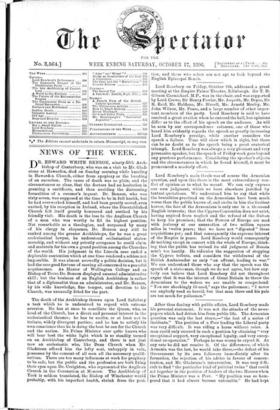After thus dealing with public affairs, Lord Rosebery made his
personal statement. It was not the attacks of the news- papers which had driven him from public life. The Armenian question was only the last straw,—" the last of a series of incidents." The position of a Peer leading the Liberal party was very difficult. It was riding a horse without reins. A man could only succeed in such a position by obtaining " very exceptional support, very exceptional loyalty, and very excep- tional co-operation." Perhaps he was wrong to expect it. At any rate he did not receive it. Of the differences, of which Armenia was the last, he would take three,—the defeat of his Government by its own followers immediately after its formation, the rejection of his advice in favour of concen- tration, and Mr. Gladstone's intervention. It was very d)ffi- cult to find "the particular kind of political twins" that could act together in the position of leaders of the two Houses when the Prime Minister was a Peer. "My position was so ham- pered that it had almost become untenable." He bad kept
his position almost beyond the conditions of dignity and self- respect because of the urgent representations of his friends. In fact, ever since the General Election those colleagues had had his resignation in their hands. Turning to his colleagues he thanked Mr. Asquith by name as being in special political communion with him. Of him he also said,—" His rare combination of head and heart will conduct him to the highest office of the State." Lord Rosebery ended his speech by congratulating himself that he was laying down his leader- ship where he had taken it up,—i.e., in Edinburgh. Mr. Asquith, in response to loud calls, said a few words of regret at the step Lord Rosebery had taken. The most memorable part of his speech was the remark that when a contract had been made it was not in the power of either party to the contract to put an end to it at his own will, "and the voice of the other party has not been heard."







































